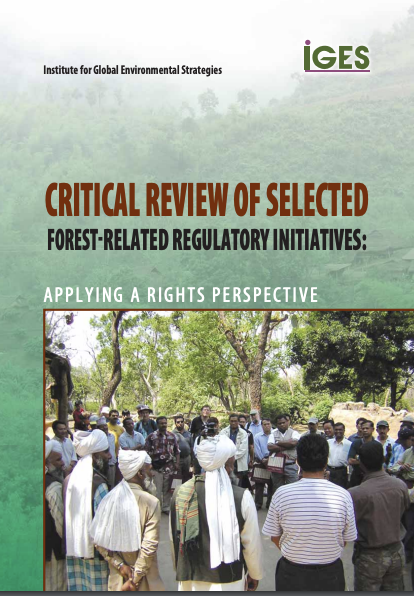Critical Review of Selected Forest-Related Regulatory Initiatives
This report brings together four studies that evaluate regulatory initiatives with implications for forest-dependent communities from a rights-based perspective. These are: The Scheduled Tribes and Other Traditional Forest Dwellers (Recognition of Forest Rights) Act, 2006 – India; Regulatory initiatives and selected outcomes of judicial processes in Malaysia; The Community Forest Act (2007) – Thailand; and The Indigenous People’s Rights Act (1997) – Philippines. Each study covers law making, content and implementation.
Simulation of the Effect of Intensive Forest Management on Forest Production in Sweden
The effects of intensifying the management of 15% of the Swedish forest land on potential future forest production over a 100-year period were investigated in a simulation study.
REDD+ and the Indigenous Question: A Case Study from Ecuador
One of the main issues regarding the implementation of REDD+ in Latin America has been the growing concern that such projects may infringe upon the rights and negatively affect the livelihoods of forest-dependent communities. Various indigenous and civil society organizations are ardently opposed to the initiative. Such is the case in Ecuador, where indigenous opposition to REDD+ represents a considerable obstacle in the creation of a national strategy since more than 60% of the country’s remaining forest cover is on indigenous land or under indigenous occupation.
People, Governance and Forests—The Stumbling Blocks in Forest Governance Reform in Latin America
This article examines common barriers to achieving adequate levels of forest resource governance in countries of Latin America. It looks at the deficiencies of the policy and regulatory frameworks affecting forests, the common failure to impose the rule of law, the main factors that constrain the effectiveness of government actions in the forest sector and at the political barriers to introducing reforms for change in governance structures. The elimination of these barriers acquires new importance in the implementation of successful REDD+ programs in the countries of the region.
Governing Competing Demands for Forest Resources in Sweden
Changing and competing land use, where we make use of a growing share of resources, potentially undermines the capacity of forests to provide multiple functions such as timber, biodiversity, recreation and pasture lands. The governance challenge is thus to manage trade-offs between human needs and, at the same time, maintain the capacities of forests to provide us with these needs. Sweden provides a clear example of this kind of challenge. Traditionally, timber has been the most apparent contribution of the forest to Swedish national interests.
REDD+ and the Indigenous Question: A Case Study from Ecuador
One of the main issues regarding the implementation of REDD+ in Latin America has been the growing concern that such projects may infringe upon the rights and negatively affect the livelihoods of forest-dependent communities. Various indigenous and civil society organizations are ardently opposed to the initiative. Such is the case in Ecuador, where indigenous opposition to REDD+ represents a considerable obstacle in the creation of a national strategy since more than 60% of the country’s remaining forest cover is on indigenous land or under indigenous occupation.
Social Geomatics: Participatory Forest Mapping to Mediate Resource Conflict in the Bolivian Amazon
This paper describes a participatory mapping method field tested with agro-extractive settlements in the Bolivian Amazon. A regional transition from customary to formal property rights resulting from sweeping 1996 land tenure reforms has led to confusion and conflicts over resource rights, a problem compounded by recent high market prices for Brazil nuts. In response to community requests to clarify resource rights to Brazil nut trees, CIFOR offered to train community members to map trees, trails and other key features themselves.
evolution of the timber sector in lowland Bolivia: Examining the influence of three disparate policy approaches
This paper assesses the influence of forest policies on forestry development, and especially timber production, in Bolivia during three different periods of time. The first period began in the early 1970s when a conservative forest policy was adopted privileging commercial logging companies, and thus fueling land conflicts in particular with indigenous people, allowing a minority to accumulate considerable wealth, and marking the onset of forest degradation.








